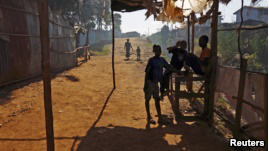
In 2013, President Barack Obama launched an activity called the Power Africa Program. Its goal is to increase the availability(可用性) of electric power in African countries south of the Sahara Desert. Millions of people there are unable to use electric power.
The American-supported program is providing money for a number of projects, including one that creates electricity from human waste.
"Mukuru Kwa Njenga" is the name of a community close to Nairobi (内罗毕) where about 100,000 people live. Many of them are poor. Until recently, most did not have electricity.
Amos Nguru had the idea for Afrisol Energy, a project that produces electricity from human waste. Two years ago, Mr. Nguru received an offer of support from the Power Africa Program. The money came from General Electric and the United States African Development Foundation.
The project now produces 15 kilowatts(千瓦) of electricity. That is enough to power a nearby school and serve the local neighborhood. Mr. Nguru says his project meets the needs of the community.
Deborah Mwandagina is deputy head teacher(副校长) of the local primary school. She says in the past, there were too many illegal connections to her school's power supply. She says this resulted in higher costs for the school, so it decided to stop using electricity.
But now the school is once again using electricity from Afrisol Energy. Doreen Kemunto is a student at the school. Her mother Beatrice Onchan'ga says darkness no longer limits the time when Doreen can study.
She says, "Before the electricity was there, our children could not be able to learn since they could not come to school that early and leave that late because the school was very dark, and they could not be able to learn."
本时文内容由奇速英语国际教育研究院原创编写,未经书面授权,禁止复制和任何商业用途,版权所有,侵权必究!(投稿及合作联系:028-84400718 QQ:757722345)
1.Why was Mr. Nguru given the money from the Power Africa Program?
A Because he thought of a way to get the money.
B Because he had an idea to use human waste to produce electricity.
C Because he lives in “Mukuru Kwa Njenga” community close to Nairobi.
D Because most people in his community didn’t have electricity.
解析:选B。细节理解题。由第四段可知,Amos Nguru had the idea…produces electricity from human waste,故选B。
2.Why did the local primary school stop using electricity in the past?
A Because the power supply was illegally connected.
B Because the cost of using electricity was very high.
C Because some people stole electricity from the supply to the school.
D Because there wasn’t human waste power station.
解析:选C。推理判断题。在过去,该学校因为有人非法在输送电路上搭接电线,造成学校用电成本上升,学校不得不停止用电,故最根本原因就是人们偷学校的电用,故选C。
3.The Power Africa Program is meant to____.
A increase the availability of electric power in America
B start Barack Obama’s activity in Africa
C give electric power to African countries south of the Sahara Desert
D enable people in southern Sahara countries to use electricity
解析:选D。细节理解题。由第一段可知,撒哈拉沙漠南部的非洲国家严重缺电,美国此举是帮助那些国家建设发电工程。由此这个项目是为了那些国家能使用上电,故选D。
4.It can be inferred from the last paragraph that______.
A the program has greatly benefited the students
B students didn’t study hard in the past
C students like to go to school now because of the power
D the program has benefited 23 percent of Kenyans
解析:选A。推理判断题。最后部分介绍该地的一所小学校过去因停电对学生学习的影响。现在有电以后,学生在学校学习时不再受到黑暗的限制,由此可推学生受益了,故选A。
5.What’s people’s attitude towards the Power Africa Program?
A Supportive.
B Opossitive.
C Indifferent.
D Cautious.
解析:选A。观点态度题。从报道内容看,当地的群众对美国的该项目还是比较赞同的,故选A。